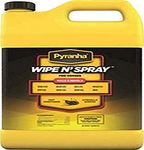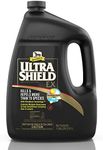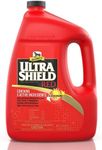Buying Guide for the Best Horse Fly Sprays
Choosing the right horse fly spray is essential for keeping your horse comfortable and protected from annoying and potentially harmful flies. The right spray can help prevent bites, irritation, and the spread of diseases. When selecting a horse fly spray, consider the following key specifications to ensure you pick the best fit for your horse's needs.Active IngredientsActive ingredients are the chemicals or natural substances in the spray that repel or kill flies. This spec is important because it determines the effectiveness and safety of the spray. Common active ingredients include pyrethrins, permethrin, and natural oils like citronella. If your horse has sensitive skin or you prefer a natural approach, look for sprays with natural ingredients. For more robust protection, synthetic chemicals might be more effective.
Duration of EffectivenessThis spec indicates how long the spray will remain effective after application. It's important because it affects how often you need to reapply the spray. Sprays can range from a few hours to several days of protection. If you need long-lasting protection, look for sprays that advertise extended effectiveness. For short-term use or less intense fly problems, a spray with a shorter duration might suffice.
Application MethodThe application method refers to how the spray is applied to the horse. This is important for ease of use and ensuring thorough coverage. Common methods include spray bottles, wipes, and roll-ons. If your horse is skittish or sensitive to sprays, wipes or roll-ons might be a better option. For quick and easy application, a spray bottle is usually the most convenient.
Water ResistanceWater resistance indicates whether the spray will remain effective after the horse gets wet, such as from rain or sweating. This is important for maintaining protection in various weather conditions. If your horse spends a lot of time outdoors or sweats heavily, look for a water-resistant spray. For indoor or less active horses, water resistance might be less critical.
Safety for Use on Sensitive AreasThis spec refers to whether the spray is safe to use on sensitive areas of the horse, such as the face and ears. It's important to avoid irritation or harm to these delicate areas. If you need to protect your horse's face and ears, choose a spray specifically labeled as safe for use on sensitive areas. For general body application, this spec might be less of a concern.
ScentThe scent of the spray can affect both the horse and the handler's comfort. This is important for ensuring a pleasant experience during application. Some sprays have strong chemical smells, while others use natural scents like citronella. If you or your horse are sensitive to strong odors, look for a spray with a mild or natural scent. For those who don't mind, the scent might be a secondary consideration.




















